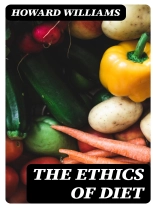In ‘The Ethics of Diet, ‘ Howard Williams presents a profound philosophical exploration of dietary choices and their ethical implications. Drawing on a rich tapestry of philosophical thought, the book engages with historical and contemporary debates surrounding vegetarianism, veganism, and the moral status of animals. Williams employs a clear, accessible literary style, inviting readers to examine their own beliefs while thoughtfully addressing common arguments for and against various dietary practices. The text is framed within the broader context of ethical consumption, encouraging readers to take a deeper look at the impact of their food choices on the world around them. Howard Williams is a prominent philosopher known for his work on ethics and environmental philosophy. His academic background and personal experiences have significantly shaped his interest in the intersections of diet and ethics. Through rigorous analysis, Williams elucidates how ethical considerations pertain not only to human health but also to environmental sustainability and animal rights, providing a compelling rationale for a more conscientious approach to eating. This book is an essential read for anyone interested in the ethical dimensions of food consumption and the responsibilities that come with it. Whether you are a seasoned vegetarian, an ethical omnivore, or simply curious about the topic, Williams’ incisive arguments and thoughtful reflections will resonate deeply, urging you to rethink your dietary choices in light of ethical considerations.
Про автора
Howard Williams (1837 – 1931) was a distinctive figure in the nineteenth-century vegetarian movement, known primarily for his work ‘The Ethics of Diet: An Historical Review of the Literature of Humane Dietetics, from the Earliest Period to the Present Day’ published in 1883. A scholarly endeavor, ‘The Ethics of Diet’ is a comprehensive chronicle of the philosophical and literary history of vegetarianism, providing biographical sketches of proponents of vegetarian ideology, stretching from antiquity to his contemporaries. Williams intricately wove the arguments for a meatless diet through the ethical considerations presented by various influential thinkers and writers, highlighting the interrelations between dietary choices and moral philosophy. His work stands as a seminal text in the field of humane dietetics, echoing the thoughts of Pythagoras, Plutarch, and Shelley, and illuminating the evolution of vegetarian thought. Williams’ literary style combines meticulous scholarship with a clear and persuasive moral stance, which has made ‘The Ethics of Diet’ an enduring piece of literature in both the realms of animal ethics and the history of vegetarianism. His contributions have been acknowledged by scholars and activists who continue to grapple with the ethical dimensions of consumption and animal welfare. Howard Williams’ legacy as an author resides in the continued relevance of his arguments for ethical and compassionate living.












